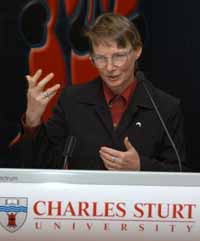 Reflecting on her long career in higher education at Charles Sturt University (CSU) on the eve of her retirement, Associate Professor Leonora Ritter, the Head of the School of Social Sciences and Liberal Studies, says her career has encompassed many changes, but her training as a historian has helped her to put those changes into perspective.
Reflecting on her long career in higher education at Charles Sturt University (CSU) on the eve of her retirement, Associate Professor Leonora Ritter, the Head of the School of Social Sciences and Liberal Studies, says her career has encompassed many changes, but her training as a historian has helped her to put those changes into perspective. “Since it began, higher education has always been buffeted by the changing winds of politics, and teaching methods have both accommodated and used the latest technologies, from the printing press to the micro-chip,” Professor Ritter said.
“My life-time of teaching also adds perspective. Since Socrates sat under trees and asked questions as a way of encouraging his students to think, the basic aim of higher education has remained the same. Now, as then, the aim is to promote the growth of wisdom in those who can make a difference in order to make the world a better place.”
Professor Ritter notes, however, that changes have occurred in the context in which this is done.
“Higher education has become more accessible as democracy and technocracy have increased the number of those who can make a difference.
“Scholarly interrogation of beliefs has become more important as secularism, multiculturalism and post-modernism have challenged long-held ‘truths’.
“Sensible, sensitive and ethical leaders have become essential in all walks of life as humanity has developed the capacity to destroy itself along with the ecosystem that supports the human race.
“Never before has our very survival been so dependent on understanding self, others and the environment.
“Higher education has a crucial role to play in promoting this understanding and thereby countering such potentially destructive forces as materialism, individualism, populism and mediocre mass media.
“This brings me back to the role of learning, teaching and scholarship. Through its focus on these activities, Charles Sturt University has made, and can continue to make, a major contribution to the creation of skilled, scholarly and socially responsible professionals, sources of wisdom who will make the world a better place.
“It has been an honour and a pleasure to contribute to this process over the past 34 years,” Professor Ritter said.





Social
Explore the world of social